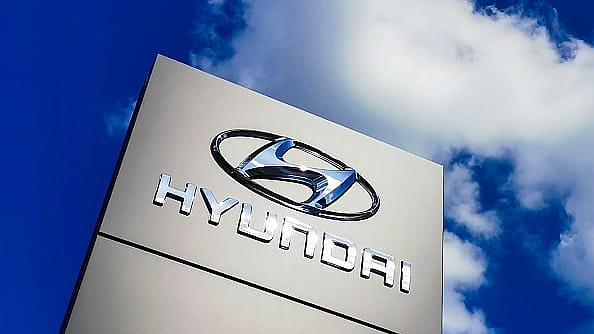Nomura sees Hyundai India on strong medium-term track, raises target price
ADVERTISEMENT

Nomura has raised its target price on Hyundai Motor India (HMI) to ₹2,291, citing “stronger visibility on medium-term growth” driven by a robust new model pipeline, export acceleration, and sustained margin performance. The brokerage maintained a ‘Buy’ rating, noting that the automaker’s results for the fourth quarter “beat on all fronts,” and that its focus on “quality of growth” positions it favourably in a challenging domestic auto market.
“While there could be near-term market share loss, we appreciate Hyundai’s long-term focus to preserve brand value,” Nomura said in its equity research report. The brokerage raised Hyundai’s FY27F valuation multiple from 23x to 25x, citing upcoming EV launches, export momentum, and a strategic capex plan to scale production from its third plant in Talegaon, near Pune.
Hyundai reported fourth-quarter revenue of ₹17,940 crore, up 1.5% year-on-year, exceeding street and Nomura expectations by 3–5%. The company’s EBITDA margin surged to 14.1%, comfortably above consensus estimates of 11.9%. Average selling price (ASP) climbed 5% sequentially to ₹9.36 lakh per vehicle, supported by reduced discounts, richer product mix, and higher export traction.
January 2026
Netflix, which has been in India for a decade, has successfully struck a balance between high-class premium content and pricing that attracts a range of customers. Find out how the U.S. streaming giant evolved in India, plus an exclusive interview with CEO Ted Sarandos. Also read about the Best Investments for 2026, and how rising growth and easing inflation will come in handy for finance minister Nirmala Sitharaman as she prepares Budget 2026.
Net profit for the quarter stood at ₹1,614 crore, slightly down 4% year-over-year, but 13–14% higher than analyst estimates.
Looking to diversify beyond a softening domestic market, Hyundai plans to raise exports from 22% to 30% of volumes by FY30. Its new Pune facility, set to begin production in Q3FY26, will serve as a hub for both internal combustion engine (ICE) and EV models, reinforcing the company’s “India-for-the-world” vision.
The Creta EV, Hyundai’s first mass-market battery electric SUV, has seen strong bookings, with 80% for the long-range variant and 70% of those for the high-end trim. The company aims to launch six EVs by FY30 and is focused on aggressive localisation of battery packs and EV components to protect margins.
Hyundai’s capex plan of ₹7,000 crore, of which 40% is for the new plant and 25% for product development, underlines its long-term strategy amid cyclical weakness.
SUVs made up 69% of Hyundai’s total sales in FY25, up from 63% in FY24, reflecting growing customer aspiration and rural demand—67% of SUVs were sold in rural markets. The company is also seeing a rise in demand for premium features: 53% of cars sold had sunroofs, and 14% had ADAS, double from a year ago.
Hyundai’s strong margin performance was aided by cost controls: raw material-to-sales ratio improved by 190bps sequentially, while staff and other expenses also declined. The company expects to maintain double-digit EBITDA margins, even as depreciation from the Talegaon plant kicks in.
Management acknowledged that FY25 was a “challenging and formative year,” with macro uncertainty and a high base affecting demand. However, with 26 new product actions planned by FY30, including model refreshes and new EVs, Hyundai is banking on “disciplined capital allocation, premiumisation and exports” to lead its next wave of growth.
Hyundai plans to hold its Investor Day in September 2025, where it will share more details about new launches and its evolving role as an export hub for emerging and advanced markets.
Despite a modest volume growth forecast (6% in FY26 and 12% in FY27), Nomura believes that Hyundai Motor India is attractively priced at 20.8x FY27F EPS, offering investors a compelling long-term bet in India’s transforming auto landscape.
